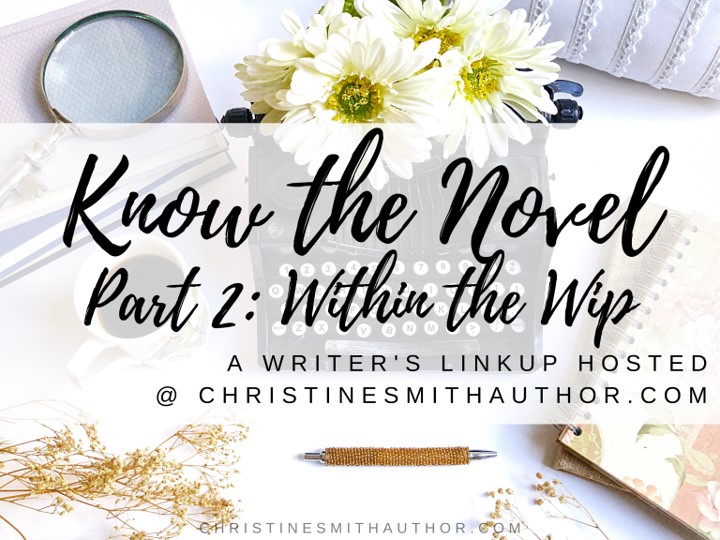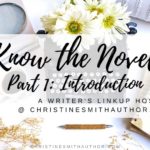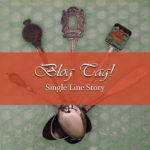Know the Novel: Part Two
 Well, everyone! It is November already! And that means . . . drumroll . . . it’s time for another edition of Know the Novel.
Well, everyone! It is November already! And that means . . . drumroll . . . it’s time for another edition of Know the Novel.
If you missed the first part of this three month series, you can check it out right here for the intro, details, and first set of questions.
The November theme for Know the Novel is “Within the Work in Progress.” So without further ado, here are Christine’s ten questions. And my ten answers.
- How’s the writing going overall?
Quite fast! Which is always a pro. While I wouldn’t say I’m quite so attached to the characters as I have been with some of my longer drafts, I’m getting big chunks written (thanks KDWC!) and haven’t hit any major roadblocks so far.
- What’s been the most fun aspect about writing this novel so far?
Hmm. Possibly the little details of the hero’s experiences. They’re not necessarily the first thing that comes to mind when you think about a story, but I always find they make a passage come alive.
- What do you think of your characters at this point? Who’s your favorite to write about?
I’d say my characters feel adequate, but not yet over-performing at this point. Writing a close POV (basically, where the whole story is told as if it were seen through the main character’s eyes) is giving me a bit of affection for Philip (through whose eyes we are seeing it.) He’s definitely my favourite character, although I’m enjoying the different voices of the three other explorers, too.
- Has your novel surprised you in any way?
One very pleasant surprise has been that negotiating the 17th century map hasn’t been more difficult, thus far. As I discussed in an earlier post portions of Hondius’ map were based on second-hand reports, and even legends. This led, of course, to errors in some of the details portrayed. These errors play a role in the story—and I wasn’t sure how many difficulties that might raise from a logistics perspective.
I will definitely need to do some spot research, but so far I’m pleased with how few plot holes it has cause.
- Have you come across any problem areas?
Hmm. As mentioned above, I don’t feel like I’ve connected super-deeply with the cast of characters at this point. Although for a middle grade adventure novel I’m not necessarily doing too badly!
In terms of other problems, I usually write a first draft with a ton of square brackets. The square brackets note basically anything that would take a bit of research, or figuring out. By just noting these points, skipping any details I don’t have, and going on with the draft, I can keep a bit more forward momentum, and then come back and address problem areas later on. In Quest of a Nameless Sea certainly has plenty of square brackets, but I’m actually kind of looking forward to coming back and dealing with them, after the first draft is done.
- What’s been your biggest victory with writing this novel at this point?
Keeping. Forward. Momentum.
(I can never decide whether I like that sentence-divided-by-periods look, but it seemed to fit, there.)
Definitely, the biggest victory thus far is that I am still pressing forwards, and getting sizable chunks of writing done most days. I’m about a third of the way through, and the plot is starting to build towards the bigger action, all of which is possative!
- If you were transported into your novel and became any one of the characters, which one do you think you’d be? Would you take any different actions than they have?
Philip, definitely. His motivation to come on this quest, because of what it will do for his relationship with his family, is definitely the most relatable of my four explorers. (At least from my perspective!)
Would I have done anything differently?
Is it completely contradictory to say, even though I related the most to Philip, I don’t think I’d have gone on the quest at all? While I do get his motivation, I am NOT a person who enjoys independence, and I don’t think I’d have chosen to go away from my family at the very time when I was struggling most to gain their approval. However, I’m glad Philip did—because otherwise, I’d have no story!
- Give us the first sentence or paragraph then 2 (or 3!) more favorite snippets!
First Sentence:
“Hurry up, boy! Do you think you can dawdle over those trumpery scrawls all day?”
Snippet One:
“You can prove to him that you are trustworthy, after all!”
That was the only thought Philip could keep in his head. It echoed over and over again, like a psalm tune, running in merciless repetition, when he’d had the fever.
This ridiculous, tantalizing quest, for a ridiculous, tantalizing sea might please his father. It might show him that Philip really was careful, and responsible, and grown up.
Philip felt his hands growing hot and moist again. What was it he found so frightening about this whole idea? If Jeanie really was right, could he afford to lose his only chance?
All at once, Philip knew what he was going to do. He did not know if it was the safest course—he didn’t even know if it was the wisest course—but he saw it was the only course that would bring him any peace of mind.
He simply could not sail in the Scarlet Cross, knowing he had left such a chance behind him.
“Alright, Jeanie,” he turned to his sister with a shrug, trying to grin as if he was looking forward to the adventure the way she seemed to be. “I’ll do it.”
Snippet Two:
Scrambling up over a massive bolder, that made him wonder how Master Humphrey and Ottaniack had even made it, with the additional weight of the canoe on their shoulders, Philip caught sight of the river, curving in another bend through the trees.
Mechanically, he reached for his waterproof case.
His fingers closed on air.
Suddenly, with a wave of horror, Philip realized he could no longer feel it’s leather strap across his shoulder. Panic-stricken, he groped in a circle through the carpet of pine needles and last-year’s decaying leaves, as if they could have swallowed up bodily the precious instruments, the navigational equipment, the pen and ink—the half-finished map.
Sir Trinian, following behind, almost tripped over Philip’s bent figure.
“Lad! You’re more dangerous than the trail itself!” exclaimed Sir Trinian, lifting his broad hat to wipe his forehead with his linen cuff. “Lost something, have you?” he added, with a change of voice.
“Yes—no—Sir Trinian, it can’t be lost!” Philip exclaimed. The distracted sound of his own voice would have made him laugh, in a different mood. Today it was too serious to be funny. What on earth was he going to do, if his whole place on this expedition were snatched away from him—and in exactly the way he had dreaded all along: his own carelessness—and the utter loss of the most valuable instruments on the expedition.
Sir Trinian’s eyes scanned Philip’s whole person. Then they widened as he, too, realized what was missing.
“It’s my own fault, as much as yours, lad,” he said. “I was walking—or perhaps we’d better say, climbing—right behind you. And I never even saw when it dropped to the ground.”
- Share an interesting tidbit about the writing process so far!
I only finalized the names for my cast of characters the night before I started draft one.
Philip Talbot had his name from the very beginning, because he’d already appeared in the first draft of Jeanie’s Scarlet Cross.
Miles Humphrey actually was originally the name of the grumpy sailor who appears in Chapter One, but then goes off stage for the rest of the book. I liked the name so much, I just had to give it to a character who was going to play a bigger role.
Sir Trinian Trent took forever to come up with. I did think seriously of calling him Sir Edmund—however, I already have an Edmond as a fairly main character in another story, (with possibly some overlapping character traits,) and it just felt like it would be too close. Trinian is a somewhat rare 17th century name, that I came across on a list drawn from British parish registers of the 1600s.
And Ottaniack came the very last of all. If anybody wants to consider compiling a list of authentic Powatan names from the records of early European contact, and then posting them in a prominent place on the internet, be assured you will have performed a much-needed service to humanity!!! Ottaniack was first called Nauiraus, after a First Nations guide who appears in John Smith’s account of his explorations in Virginia. However, for whatever reason, Nauiraus didn’t really look authentically aboriginal to me. It is, obviously, but I was concerned that it would feel unrealistic. So I settled on Ottaniack, which was actually one of the variant names of Pocahontas’ father—one of the first Powhatan chiefs the Jamestown settlers came in contact with.
- Take us on a tour of what a normal writing day for this novel looks like.
Where do you write? What time of day? Alone or with others? Is a lot of coffee (or some other drink) consumed? Do you light candles? Play music? Get distracted by social media (*cough, cough*)? Tell all!
This is a question people want answered from time to time, and it has always felt incredibly personal—and vulnerable—to me. However, I’m not sure that needs to be a problem, so here goes:
I write at a (frequently cluttered) pine desk in my bedroom.
I do virtually all my serious, for-business writing in the morning. Despite the fact that I’m more of a night person, my brain seems to work better at the start of the day.
The only thing I drink while I’m writing is bottled water. (Unless I happen to have a cold, in which case I frantically swallow almost every hot drink that comes to hand!)
I don’t do candles or music while I’m writing, although I often do have a playlist that’s associated with my story, that I’ll listen to at other times.
Get distracted by social media? Yeah, but that one cuts two ways. I do get distracted. By research. And by media. And by emails. But also by my project itself. If I’m supposed to check back to something at a given time, there is a very good chance I’ll miss it entirely—sometimes even when I’ve set an alarm, or have a laundry buzzer going off—if I’m writing.
Know the Novel: Part Two
And there we are! Thanks again, Christine, for doing the brainstorming by coming up with these questions. As well as hosting the Know the Novel linkup in the first place!
Don’t forget to check out all the other great bloggers participating in this challenge:

Ever wished you could take a peek behind the scenes at the process of planning and drafting a novel? Christine Smith’s Know the Novel: Part One offers the chance to do just that!

The close-knit community of Homewood, Minnesota might not even be a dot on most maps. But from its earliest settlement to the present day, a warm Christmas welcome and a shining Moravian star have been its hallmarks of the holiday. If you love clean, heartwarming Christian Christmas stories, then A Homewood Christmas is definitely for you!

Can you put an entire story into a single line? That’s what this challenge is all about! Whether you’re a writer or a reader, you’ll want to check it out!

